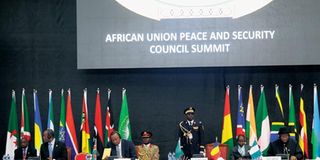Finally African leaders wake up to the harsh reality of runaway insecurity

President Kenyatta (third left) and other leaders during the African Union Peace and Security Council Summit at the Kenyatta International Convention Centre on September 2, 2014. PHOTO | BILLY MUTAI |
What you need to know:
- President Kenyatta said poaching and money laundering are part of the illegal trade terrorists use to finance their bloody crimes.
- The objective of the Nairobi meeting is to undertake an in-depth review of the terrorism in Africa and the ongoing AU’s efforts to combat it.
Securing porous borders is the main challenge for African states in the fight against terrorism.
It is through these exposed borders that violent extremist groups carry out illegal transnational trade to finance their activities, the African Union Peace and Security Summit at the KICC heard on Tuesday.
Human and drug trafficking are part of such trade, Deputy Chairman of the AU Commission Erastus Mwencha said.
POROUS BORDERS
President Kenyatta said poaching and money laundering are part of the illegal trade terrorists use to finance their bloody crimes, while poachers use the porous borders to sneak into the country.
Kenya’s border with Somalia is an entry point for Al-Shabaab insurgents. The 800km has only three designated border points, said the President, who, on a recent visit to the US, appealed for help to secure the border.
The AU has expressed deep concern over the terrorism threat on the continent, particularly in the Horn of Africa.
Regions threatened by terrorism include the Sahel-Sahara and the Central African region, where the Lord’s Resistance Army has been attacking innocent people.
The concerns over terrorism were captured in the Report of the Peace and Security Council (PSC) on its Activities and the State of Peace and Security in Africa during the 23rd AU Summit in Malabo, Equatorial Guinea on June 26 and 27.
IN-DEPTH REVIEW
This is the report that the AU member states are discussing in-depth at Kenyatta International Convention Centre.
Commissioner for Peace and Security Smail Chegui took the meeting through the PSC report.
Chad President Idriss Deby chaired the summit. He is the current chairman of AU Peace and Security Council.
Presidents Goodluck Jonathan of Nigeria, Jakaya Mrisho Kikwete of Tanzania, Yoweri Museveni of Uganda and Hassan Sheikh Mohamud of Somalia attended the summit.
Delegations from the Gambia, Ethiopia, Libya and South Africa were led by their ministers, while ambassadors from Equatorial Guinea and Mozambique represented their countries.
The objective of the meeting is to undertake an in-depth review of the terrorism in Africa and the ongoing AU’s efforts to combat it.
In his opening speech, Mr Deby said that organised crime groups have taken advantage of the continent’s porous borders to perpetrate their heinous acts.
“We need to intensify our efforts in combating these forces of evil,” he said.
Mr Jonathan said terrorists were kidnapping people and demanding ransom.
“It should be a patriotic duty for every African to fight terrorism,” Mr Mwencha said.
The Heads of State discussed other issues such as radicalisation of youths. They cited ethnic conflict as another issue that terrorists had taken advantage of.
“We must make available resources required for this fight,” Mr Kenyatta said.”
Representatives from the Organisation of Islamic Cooperation (OIC) and the Arab League said Islam should not be linked to terrorism.





